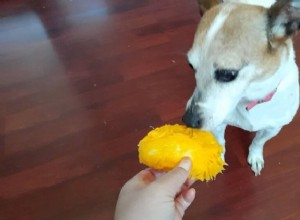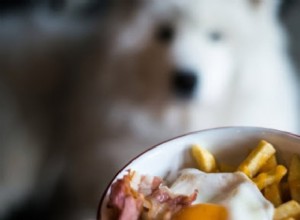
飲み物は人間にとってのメリットがぎっしり詰まっているかもしれませんが、犬は牛乳を飲むことができますか? それとも牛乳は犬にとって悪いのでしょうか?最終的には、犬の消化器系に依存するため、ケースバイケースで答えが変わります。少量の飲酒がペットにとって有毒になる可能性は低いですが、決して大量に摂取すべきではなく、一部の犬はそれを完全に避けるべきです.
それはすべて、牛乳に含まれる天然の糖である乳糖と、それを消化する子犬の能力にかかっています。あなたの犬が乳糖不耐症かどうかを見分ける方法、胃腸の強い犬にとって安全な牛乳の量、犬の食事に含まれる乳製品の詳細については、以下をお読みください。
目次:
プロのヒント: ペット保険プランは、アレルギーの検査と管理の費用をカバーするだけでなく、保険でカバーされる他の多くの病気や怪我に対する獣医の治療費を負担するのに役立ちます.
多くの犬は少量の牛乳を安全に摂取できますが、乳糖不耐症の犬もいます 、つまり消化器系が ラクターゼ と呼ばれる酵素を十分なレベルで生成していないことを意味します 牛乳中の糖、つまりラクトースを分解する役割を担っています .
VCA Animal Hospitals によると、乳製品は犬の有害な食物反応の主な原因です。各反応の重症度は、乳製品の製造方法によってレベルが異なるため、犬の消化管がラクトースをどれだけうまく処理できるか、特定の食品や飲料に含まれる糖の量によって異なります。一部の犬は、糖分が非常に高いために牛乳を飲むことができませんが、乳糖レベルが大幅に低いため、他の種類の乳製品 (カッテージ チーズなど) にはまったく問題なく耐えることができます。
乳糖不耐症は、未消化の糖分子が消化管 (GI) 管を通って移動することによって引き起こされます。これは、血流に吸収される栄養素を分解するのに十分な酵素を生成できないためです. When it enters the colon, water is then drawn to the undigested sugar molecule, leading to a loss of water retention in the tissue walls, inflammation of the large intestine, and diarrhea consisting of loose, watery stool - a condition otherwise known as colitis in dogs.
The reason why puppies can drink milk, though many mature dogs cannot, is because puppies have an abundance of lactase enzymes that break down their mother's milk while nursing. Once they are weaned, their bodies will produce less of the enzyme to adjust to its new nutritional demands, at which point many dogs develop an intolerance.

Puppies can drink milk strictly from their mother because it's full of antibodies and necessary nutrients for healthy development. Cow's milk and other dairy sources can cause unpleasant effects on a puppy's delicate digestive system.
But, what happens if a puppy is orphaned? In circumstances where a safe alternative must be found in lieu of the mother's milk, commercial replacements are a better option than cow's milk for puppies. That's because milk from a dog is richer in calories and essential proteins, plus it's much easier for pups to digest than dairy sources. Be sure to consult your vet before choosing a suitable milk replacement for newborn puppies.
Pets can't tell us when they're not feeling well, so it's important to keep an eye on their behavior in order to recognize the clinical signs of illness, including adverse reactions to food. The symptoms of lactose intolerance in dogs can range from mild to severe, and most often appear as:
Most of the time, pet parents don't knwow their dog can't drink milk until they obviously demonstrate the symptoms of lactose intolerance after consuming dairy. However, some dogs only display a mild intolerance with less clear symptoms. A vet's diagnosis is the only way to know for certain whether your dog can drink milk without issue, but you may be able to recognize the signs if you notice any of these red flags:
In other cases, lactose intolerance may be confused with a dairy allergy in dogs , which refers to the inability to tolerate the proteins in milk and can be far more serious. In addition to the symtoms above, dogs with dairy allergies might display signs such as:
If you notice any of these adverse reactions, call your vet immediately or head to a local animal hospital. It it may lead to anaphylactic shock, an emergency medical condition that's potentially fatal without expedient treatment.
Many dogs are lactose-intolerant to at least some degree, but it should still be offered very judiciously to dogs that have stronger stomachs with no dairy sensitivity. Though they may be able to tolerate the sugar and protein, whole milk has a high fat content that could trigger vomiting and diarrhea nonetheless. It's also high in calories due to the fat and sugar content, so if dogs drink milk or eat dairy frequently, they could develop obesity or pancreatitis.

Aside from the possible long-term health consequences, dogs can drink milk safely so long as they don't have a dairy allergy and it's fed in small amounts. To stay on the safe side, be sure to speak with your vet before introducing new foods into your pet’s diet .
With your vet's approval, dogs can drink a few sips of milk as an occassional treat. A few tablespoons of milk from time to time probably won’t cause them any harm, but offering larger quantities may lead to negative, short- and long-term effects.
As with all treats, it’s a good idea to follow the 90/10 rule and limit your pet’s treat intake to no more than 10% of their total daily calories .
There are several different types of milk beverages, and as plant-based sources become increasingly available, many pet parents wonder if their pups can also drink almond milk, oat milk, soy milk, and similar lactose drink replacements.
Almond milk is one of the most popular plant-based types of milk, but can dogs eat almonds? Although these nuts aren't toxic to dogs, canines generally don’t digest them very well. Almonds are also high in fat, which can result in weight gain and pancreatitis if consumed in big amounts.
However, small amounts of almond milk (a couple of tablespoons) should be fine if offered as an occasional treat . Make sure to read the ingredient list of almond milk to check if it contains added sugar or xylitol, an artificial sweetener that's very harmful in dogs.
Oat milk is another plant-based dairy alternative that is safe for dogs to drink in small quantities, as it could be difficult to digest in large volume. Oats are not toxic to canines, so this could offer a good lactose substitute for weaning puppies who like the taste as well as dogs who need additional calories to meet their nutrition requirements.

Coconut milk won’t harm your pet if you served in moderation . Dogs can eat coconut for the many different benefits it offers - from a softer, shinier coat to alleviated skin irritation - but keep in mind, coconut contains oils that could cause GI upset and diarrhea if dogs consume too much.
Make sure to check the ingredient list before offering your dog coconut milk, as some brands can be overly processed and can contain additives that your dog doesn’t need.
In general, dogs digest soy products well, so soy milk in moderate quantities is not harmful to dogs. In fact, many commercial dog foods contain soy-based ingredients.
This non-dairy, plant-based milk alternative contains proteins called isoflavones that are known to reduce cholesterol in humans and, according to anecdotal evidence, can help with urinary incontinence in dogs. Some vets might even recommend supplements containing isoflavones.
As with all dairy products, moderation is key. Compared to cow's milk, goat’s milk is higher in some nutrients such as potassium and calcium, but lower in others, like folate and vitamin B12. Goat’s milk also contains less lactose than cow’s milk, and proponents claim that because of the differences in its protein and fat structures, lactose-intolerant dogs can drink milk from a goat with less likelihood of sensitivity and allergic reaction due to an easier digestive process.
If you’re interested in feeding your dog goat’s milk, start with a small amount to see how they tolerate it, and only serve it from time to time.
プロのヒント: If your pup snacks on something they shouldn’t, pet insurance is one way you can cover the cost of gold-standard veterinary care that may be necessary for the surgical removal should a foreign body lead to intenstinal blockage.
Generally speaking, it’s safe to feed dogs a small amount of dairy on special occasions, as long as they do not have any known food sensitivities. It's best to offer dogs dairy products that have low lactose content, such as plain yogurt (4 grams per 1/2 cup), cottage cheese (3 grams per 1/2 cup), and cheddar cheese (0 grams of lactose).
Dogs can eat cheese in most varietals thanks to its low lactose levels, and yogurt is often beneficial in dogs with stomach upset because it contains prebiotics that can alleviate gas or diarrhea.
It may be tempting to give your dog a bite of ice cream, but be very careful and make sure to check the label for chocolate and xylitol 予め。 These two toxins are very common and extremely dangerous in canines, so exerise caution wherever it may be present.
If your dog gets their paws on a large helping of milk, monitor for symtpoms of abdominal distress. Gastric upset will generally occur within about 12 hours after a dog drinks milk but can last for much longer, so prepare for frequent trips outside so your poor pup can relieve themselves. If you notice these signs of lactose intolerance, or a change in behavior possibly caused by dairy's adverse effects, call your vet right away.

人間と同じように、多くの犬は果物が大好きですが、マンゴーは犬にとって安全ですか?簡単に言えば、はい、犬はマンゴーを食べることができます.ビタミンの優れた供給源ですが、提供する果物の部分と量に注意する必要があります。 犬がマンゴーを安全に食べる方法について詳しく見ていきましょう。 マンゴーは犬に良いですか? マンゴーは犬に悪いですか? 犬はマンゴーを何個食べられますか? 犬にマンゴーを与える方法 重要ポイント プロのヒント :食べてはいけないものを食べるのが好きなペットを飼っている場合、ペット保険は不測の事態に備えるための優れた方法であり、緊急手術後に高額な請求書に悩まされることはありま

夕食のテーブルから犬にポテトを分けてあげたいと思いませんか?もちろん、あなたは彼らがその大きな目で見ているときです!しかし、私たちが消費するすべての食品がペットにとって安全であるとは限りません。たとえば、じゃがいもは無害に見えますが、犬はじゃがいもを食べることができますか? 答えは、子犬に与える量と調理方法によって異なります。じゃがいもを生で食べると、望ましくない健康被害を引き起こす可能性が非常に高くなります。 プロのヒント: ペット保険は、獣医の費用を大幅に削減できます。生のじゃがいもを食べたなどの病気が発生する前に必ず取得してください。費用の最大 90% が払い戻されます。 ジャガ